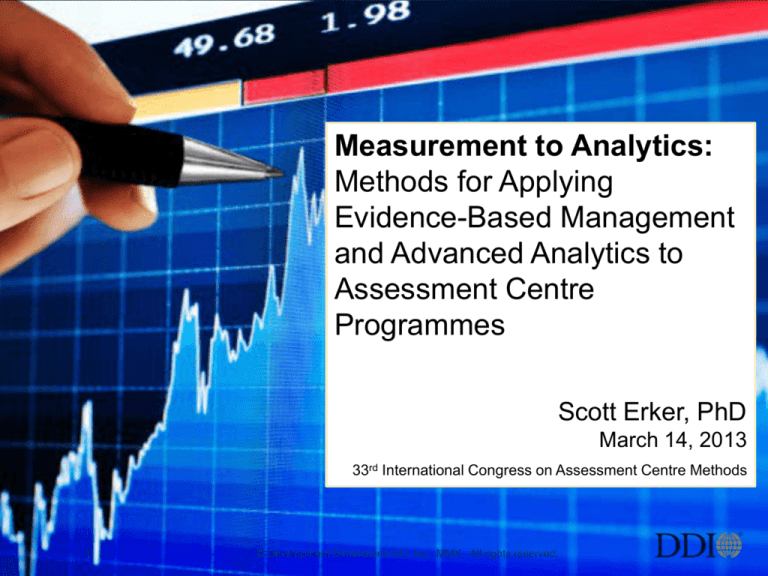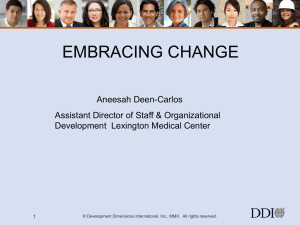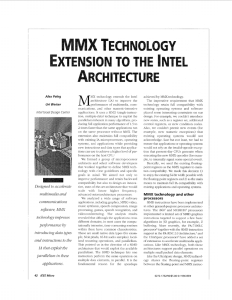
Measurement to Analytics:
Methods for Applying
Evidence-Based Management
and Advanced Analytics to
Assessment Centre
Programmes
Scott Erker, PhD
March 14, 2013
33rd International Congress on Assessment Centre Methods
1
© Development Dimensions Int’l, Inc., MMX. All rights reserved.
2
© Development Dimensions Int’l, Inc., MMX. All rights reserved.
HR Analytics Assumed as
Part of Big Data
3
© Development Dimensions Int’l, Inc., MMX. All rights reserved.
What is HR Analytics…?!?
Business intelligence (BI):
1. BI is a set of theories, methodologies,
processes, architectures, and technologies that
transform raw data into meaningful and useful
information.
2. BI can handle large amounts of information to
help identify and develop new opportunities.
3. Making use of new opportunities and
implementing an effective strategy can provide a
competitive market advantage and long-term
stability.
4
© Development Dimensions Int’l, Inc., MMX. All rights reserved.
Purpose of HR Analytics
•
Support decision making for HR systems, business operations, and
organizational strategy.
•
Help us to understand talent capability, capacity, and trajectory.
•
Aid in our ability to analyze, predict and control our talent programs.
•
Drive simplification through common language of what is important.
•
Contribute to transparency of HR results to drive both action and
accountability.
•
Create foundation for predictive analytics and scenario planning to answer
“what-if” questions.
•
Support efforts to make HR efforts transformational instead of transactional
.
5
© Development Dimensions Int’l, Inc., MMX. All rights reserved.
What analytic value can Assessment
Centres Provide?
•
By definition, ACs provide accurate, objective, reliable data.
•
Most ACs provide many data points about an individual at a
moment in time.
•
Aggregation of data can be interpreted at a group level – by
region, by business unit, by...
•
Benchmarking capability is perceived to have high value.
•
When combined with other information, AC data patterns can
reveal great insight into our interventions and decisions.
6
© Development Dimensions Int’l, Inc., MMX. All rights reserved.
Analytic Framework
7
© Development Dimensions Int’l, Inc., MMX. All rights reserved.
Analytic Development Process
What Critical Business Questions Need to be Answered?
8
What Data Are Required to
Answer the Business
Questions?
Do We Have the
Data?
Are We
Confident in the
Data?
What Analyses Will Yield the
Insights to the Questions?
Repeatable and
Scalable
Governing
Policies
How Will We Present Results
to Those Asking Questions?
Simple, Intuitive,
Informative
Compels Action
© Development Dimensions Int’l, Inc., MMX. All rights reserved.
Basic Talent Questions:
AC has a role to contribute
Summarize
• How many assessment have been conducted?
• How do participants feel about the process?
• What does the performance profile look like for
my leaders? Development needs? How do they
differ by region, dept., etc.
• Where do high performing people come from?
• What differences exist between departments in
my organization?
Benchmark
9
• How does my organization’s performance
profile compare to industry norms?
© Development Dimensions Int’l, Inc., MMX. All rights reserved.
10
© Development Dimensions Int’l, Inc., MMX. All rights reserved.
11
© Development Dimensions Int’l, Inc., MMX. All rights reserved.
12
© Development Dimensions Int’l, Inc., MMX. All rights reserved.
Future-focused Talent Questions:
AC has a role to contribute
Predict
Forecast
Extrapolate
13
• Are strong performers in the assessment more likely to help
the business achieve key outcomes?
• Does performance on the assessment predict employee
engagement?
• How long will it take to develop ‘ready-now leaders’ given
current trajectory?
• What challenges might we face in filling leadership roles in a
region we want to expand into?
• What financial impact would there be if we promoted all leaders
vs. ready now leaders?
• How are assessment results changing over time? What does
this mean for my business?
• Are we wasting assessment results by not providing timely
feedback?
© Development Dimensions Int’l, Inc., MMX. All rights reserved.
From Data Capture to Data Analysis
FIRMENLOGO
14
© Development Dimensions Int’l, Inc., MMX. All rights reserved.
A New Approach
Assessment Centre Analytics
Data Collection is predictable and on-going
Automate as much as possible
Use triggers instead of manual surveys
Provide feedback to encourage participation
FIRMENLOGO
15
© Development Dimensions Int’l, Inc., MMX. All rights reserved.
Assessment Centre Analytics Model
Participant: Assessment &
Reactions Survey
Participant: Process
Evaluation Survey
Feedback & Development Planning
1 week
Manager Process Evaluation Survey
(Micro/Macro)
Participant:
Development Process Survey
3 month
Participant:
Work Performance Survey
Business
Outcome
Measures 1 year
6 month
Manager: Work Performance Survey
FIRMENLOGO
16
© Development Dimensions Int’l, Inc., MMX. All rights reserved.
Event Analysis
January
March
May
July
September
November
Event
New Competency
Model Identified.
Event
New Assessment
System Launched.
Event
Event
Jan
Feb
Apr
May
Jun
Aug
Sep
Nov
Dec
February
April
June
August
October
December
Event
Event
Event
Event
New Training
Courses Offered
for Entry-Level
Leaders.
Event
17
© Development Dimensions Int’l, Inc., MMX. All rights reserved.
Event Analysis
July
New Assessment
System Launched.
Jan
Feb
18
Apr
May
Jun
Aug
Sep
© Development Dimensions Int’l, Inc., MMX. All rights reserved.
Nov
Dec
A connecting theme of our observations is that
analytic projects are often stymied because of
failures to appreciate that - Both data-driven
analytics and expert decision making have
strengths as well as limitations - and that the
strengths and limitations of each must be
counterbalanced with those of the other.
A Delicate Balance: Organizational Barriers to Evidence-based Management
Guszcza & Lucker – Deloitte Review Issue 10, 2012
19
© Development Dimensions Int’l, Inc., MMX. All rights reserved.
Thank you!
scott.erker@ddiworld.co
m
20
© Development Dimensions Int’l, Inc., MMX. All rights reserved.









